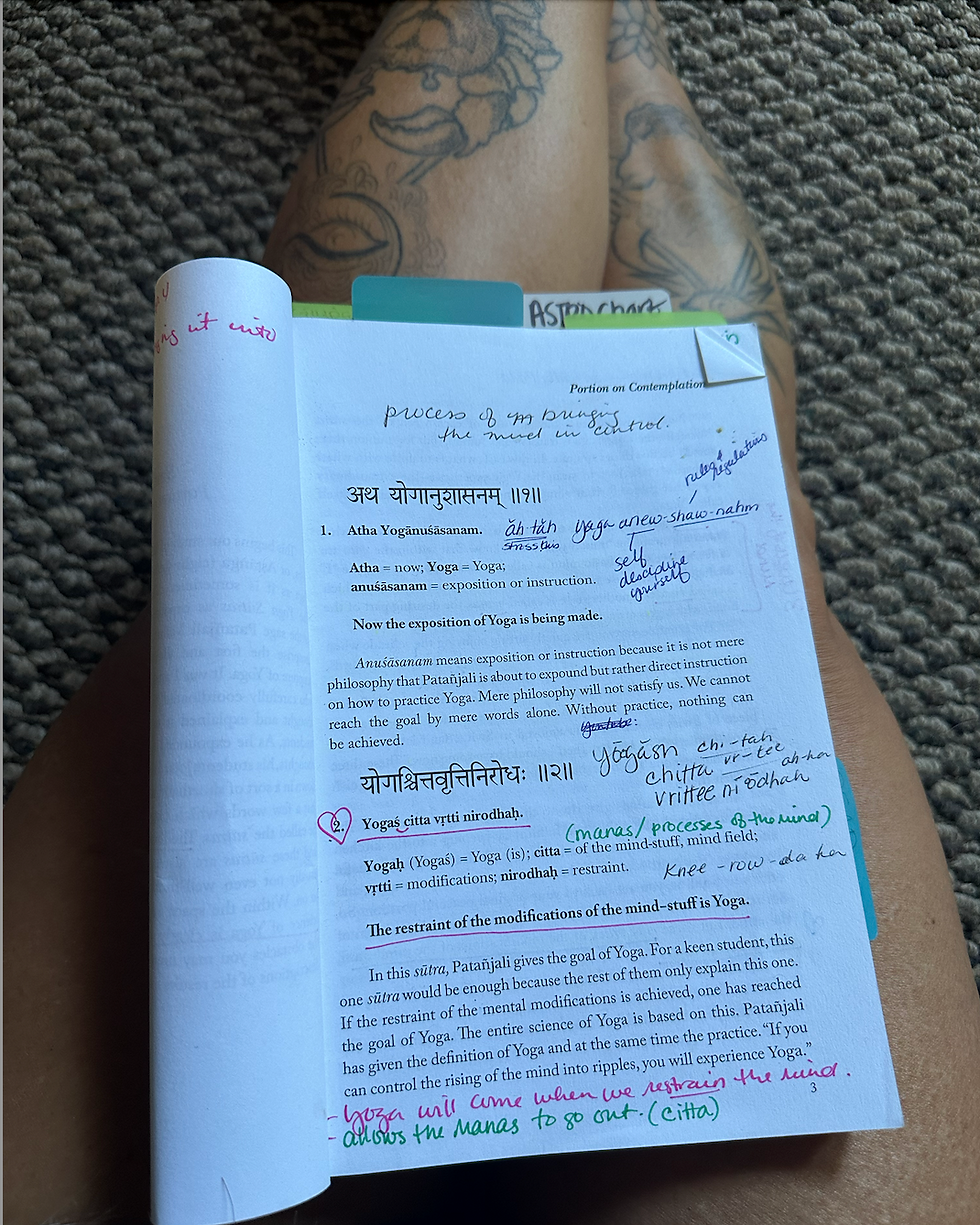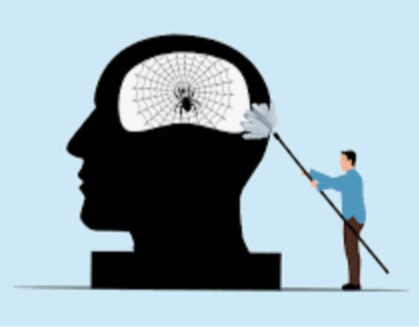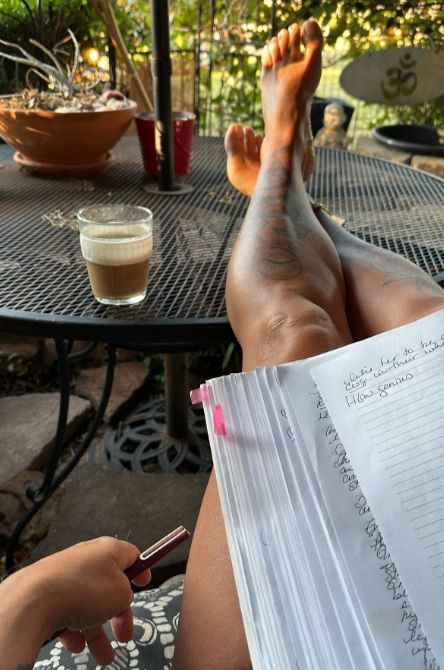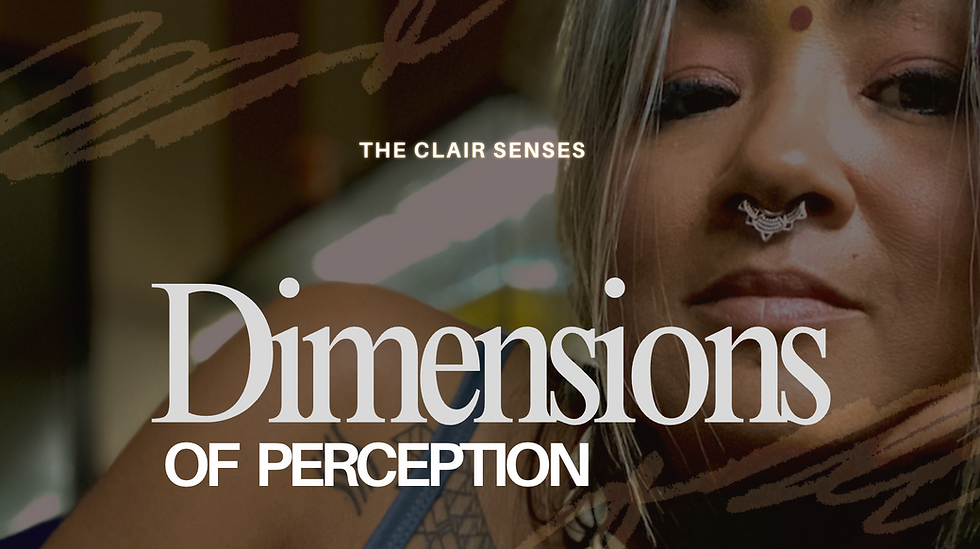Revisiting Yoga's Ancient Wisdom on Yogas Citta Vritti Nirodhah and Mind Clarity Through Journaling
- Polly Behringer

- 5 days ago
- 6 min read

When I first discovered Yogas Citta Vritti Nirodhah, a sutra, on clearing out the mind chatter I was sitting on a cold, tiled floor in a large, open space in southern India. My teacher, Swami Priyaananda, a thin woman in her 70's with short grey hair, sat in a chair in front of our small group. She randomly went through our group asking questions about the yoga sutras we were studying that day.
She stopped at me and asked, What does sutra mean? Blank and frozen to the floor, I couldn't remember. I just read it - I thought to myself. I could feeeeeeel my heart rate rising, my mind searching. It was like someone turned off the lights; and I couldn't remember. We had just discussed it; she tried giving me hints. It was in the very title of our course book.
I didn't fully recognize then while studying in India, that I couldn't remember much of anything. Our days will filled with intensive studying, early meditations, fasting and deep studying, testing and teaching in front of the group at random. It wasn't the pressure that led me have gaps in my mind. I was blacking out through practicums, during our daily studies and staying up under my bed sheets with a book light studying while my roommate slept quietly through the night.
Both myself and my roommate owned yoga studios. She was a certified teacher like myself and had a solid practice back home. I had just earned my city's award for yoga studio of the year... And here I was, unable to remember anything... even the practice flows we were learning.
The Mind - Chatter
In a fast-paced world where wait times are one of the leading factors people become verbally and physically aggressive, finding mental clarity and peace is more important than ever. With constant notifications and distractions everywhere, it’s easy to feel overwhelmed. One timeless practice that still resonates is "Yogas Citta Vritti Nirodhah," from Patanjali’s Yoga Sutras. Basically, it’s about calming the mind by reducing mental chatter—an important step toward feeling more centered. When you combine this with journaling, it can really help you manage the chaos of your thoughts and emotions better.
"Life moves pretty fast. If you don't stop and look around once in a while, you could miss it," (Ferris Bueller's Day Off, 1986)
There's a million exit ramps that could stem from the first sentence alone; and diving into them will be well worth it in time. But in this article, let's begin by breaking down what Yogas Citta Vritti Nirodhah really means, how journaling can help clear your mind, and why going back to these old-school practices can actually be super useful in our hectic, modern lives.
Understanding Yogas Citta Vritti Nirodhah

Yogas Citta Vritti Nirodhah means "the cessation of fluctuations of the mind." In simple terms, it teaches us about managing our thoughts to foster mental stability. According to Patanjali's Yoga Sutras, Citta is the mind, Vritti are the fluctuations or modifications of the mind, and Nirodhah refers to restraint or control.
This principle suggests that when we don’t manage our thoughts, we may experience confusion and suffering. Yoga, therefore, aims to reduce these mental disturbances, leading to more self-awareness and peace. For instance, studies show that regular yoga practice can lead to a 30% reduction in stress levels and increased concentration in daily tasks.
And this was why I was blacking out... I wasn't able to manage my thoughts. I was experiencing confusion through switching up my breathing techniques altering my body's reaction to stress... without looking at the stress. I was experiencing suffering on a daily basis; concerned with my relationship's aloofness surrounding my finances back home (I had given up custody of my accounts to a boyfriend in the US while in India) and being placed in bad situations at the institute with a fellow student who was battling addiction and bullying others daily.
The core aim of yoga is to rise above these distractions and connect with a deeper sense of self. This connection paves the way for practices like meditation and journaling, which can help achieve clarity.
The Role of Journaling in Mind Clarity

Journaling can significantly enhance the practice of yoga, offering a structured way to reflect on personal thoughts and feelings. Writing can help individuals explore their internal experiences more profoundly, facilitating the principles of Yogas Citta Vritti Nirodhah.
One major advantage of journaling is its ability to clear mental clutter. Studies have found that expressive writing can improve problem-solving skills by 16%. When thoughts are pulled from our minds and placed on paper, we create space to breathe. This act allows us to step back from overwhelming emotions and gain a clearer perspective.
Additionally, journaling acts as a mirror, revealing patterns in our thinking. By recognizing these patterns, we can begin to address hidden issues, effectively reducing the mental fluctuations that can lead to stress and anxiety.
Clear the Mind Chatter with Focused Prompts
To maximize the benefits of journaling in relation to Yogas Citta Vritti Nirodhah, consider incorporating focused prompts. Here are a few examples:
What am I currently feeling?
This question encourages you to identify your emotions without judgment, helping acknowledge feelings that may disrupt your mental peace.
What thoughts keep recurring?
Reflecting on recurring themes can help you understand the factors contributing to your mental clutter.
How am I better today than yesterday?
This allows you to see yourself in a different place allowing you to rewire how you see yourself and reframe your past experiences from a place of personal, self - growth and forward movement.
Using thoughtful prompts like these can lead to deeper reflections and help you stay aligned with the principles of Yogas Citta Vritti Nirodhah.

Benefits of Combining Yoga and Journaling
The union of yoga and journaling serves to enhance both practices. Yoga creates a calm atmosphere, while journaling provides the opportunity for reflection. Whether you choose to journal after a physical yoga practice or a non-physical yoga practice, journaling to reflect of your mind and body fluctuations is powerful. Together, they work hand in hand to foster self-discovery and clarity.
Research indicates that people who regularly engage in both yoga and expressive writing experience less anxiety and greater emotional well-being. A study published by the Journal of Health Psychology found that individuals who practiced expressive writing alongside mindfulness activities reported 45% better emotional regulation.
Establishing a routine that includes both yoga and journaling can improve cognitive functions and emotional health. Dedicating time for yoga can create mental readiness for journaling, allowing for a more open exploration of thoughts and feelings.
Is This Ancient Practice Worth Revisiting?
These modern times are filled with distractions that challenge our pursuit of inner peace. Given this setting, revisiting the ancient wisdom of Yogas Citta Vritti Nirodhah and weaving in journaling can be extremely valuable.

Engaging with these practices can promote a healthier mindset, improve emotional balance, and help cultivate mindfulness in a world that often feels chaotic. The consistency of these ancient methods may prove essential for those seeking not just survival, but a more fulfilling, peaceful existence.
Embracing Ancient Wisdom for Modern Peace
The integration of Yogas Citta Vritti Nirodhah with journaling provides a profound approach to achieving mental clarity and self-awareness. The insights from ancient yoga can guide us in managing our thoughts, while journaling serves as a tool for navigating the complexities of our emotions.
As life continues to move quickly, embracing these ancient practices can provide the solid foundation many of us need. By intentionally setting aside time for both yoga and journaling, you may find that this journey inward transcends mere relaxation—it leads to lasting clarity and inner peace.
Thank You!

I hope you’ve enjoyed this article. I feel like I’m really in the flow lately—trusting my intuition and embracing divine guidance. I know this is a direct act of stepping into vulnerability with my purpose.
I’m working on a refined approach to journaling with habit tracking and building a system that fits a multifaceted lifestyle —one that keeps me grounded in the present and aligned with what I truly value and want to achieve. This seems to be one of the most challengings areas for others that journal too.
Polly Behringer
Holistic Modalities for Healing Trauma
Babaylan




Comments